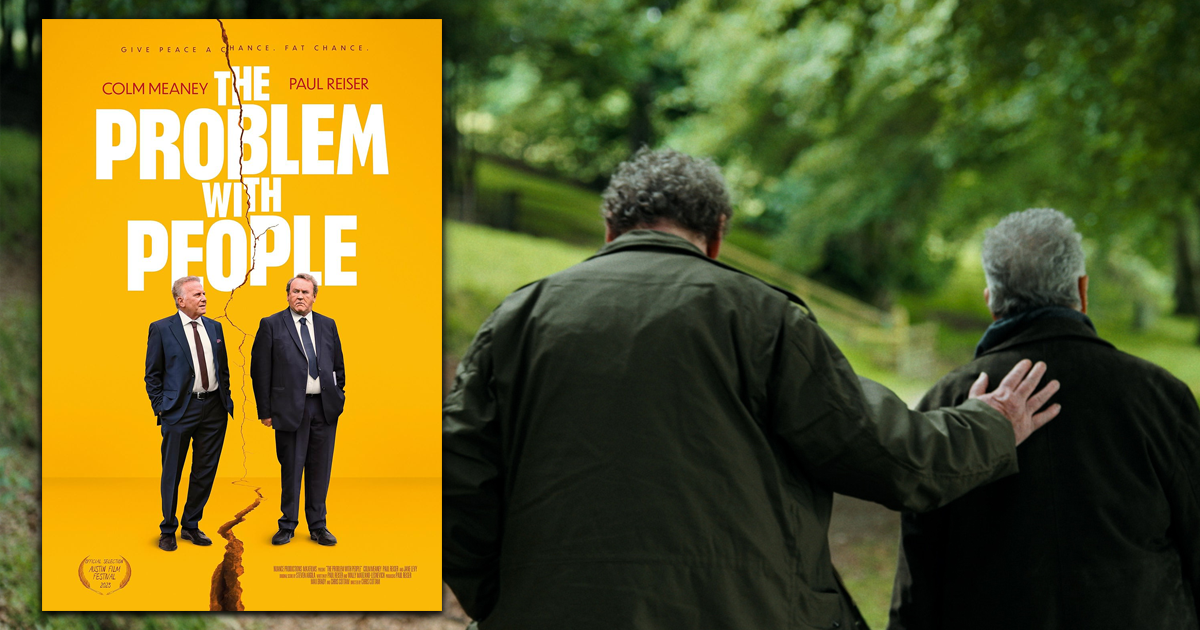The problem with The Problem with People is that it is so determined to be light-hearted in how it deals with an unpleasant aspect of human nature – our talent for conflict – that it is neither realistic enough nor cheerful enough. It works very hard both to provide enough of a bite to be an enjoyable watch while also being stress-free. It feels unkind to call this style “inoffensive” but the plot, such as it is, depends on ordinary selfishness and nothing more. This unusual choice makes the movie worth seeing if only to study how the screenplay handles characters who aren’t interested in conflict, but find themselves in conflict all the same.
Ciaran (Colm Meaney, solid as ever) lives in a small Irish village with his terminally ill father Fergus (Des Keogh). Des decides that before he dies must put right a family schism that’s bothered him all his life: his own father and his father’s beloved brother had a falling-out that resulting in the two family branches cutting all contact. But Des knows the cousins are in America and insists to Ciaran that it’s time to extend an olive branch. Over his better instincts, Ciaran gets to work at finding them – using the phone book, not even social media – and tracks down cousin Barry (Paul Reiser, who coproduced and cowrote the script with Wally Marzano-Lesnevich) in New York. Barry knows the other side of the story and is willing to bury the hatchet. The village is thrilled at the good news, starting with pub landlady Fiona (Lucianne McAvoy), who has her own reasons for being this involved with Ciaran’s life. On the other hand Barry’s daughter Natalya (Jane Levy) doesn’t quite understand what her father wants from meeting all these people. But Barry is at a loose end professionally with time on his hands and knew his dad was bothered by the family rift. Besides, he is curious to see the old country for himself, and get a sense of what really happened from his newfound cousin.
The American city mouse interacting with the Irish country mice has been done to death onscreen, but here the focus is less on ridiculous locals and more about two middle-aged men, set in their ways, trying to move outside of their comfort zones. Flashback scenes depicting the brothers’ falling-out are done in lovely animation which adds poignancy to their pretty ordinary reasons for cutting contact. Director Chris Cottam largely steers clear of fiddle-dee-dee cliché as he investigates the very normal reasons people stop talking to each other. Misunderstandings, hurt feelings, selfishness and injured pride are universal feelings, but both Ciaran and Barry are trying very hard to rise above human nature to find common ground with each other. Barry’s fatherly pride in Natalya is very charming, only matched by Ciaran’s pride in his village and the life he enjoys there. There are plenty of prostate jokes and discussions of ex-wives to ensure no one ever gets too high an opinion of anybody else, and there’s enough salty language to stop things from spilling into schmaltz.
And yet the real issue with the movie is how hard it is to find a dramatic push in everybody doing their best and trying really hard to get along. The stakes here are so low-key and everyone is so well meaning the machinations of the plot are awkward in how they attempt to generate new actions and choices. It’s interesting to see an experiment with non-traditional sources of conflict, whether or not it entirely works. It never resorts to TV-movie apple-festival cliché but not by much, which is also designed to appeal to audiences of a certain age.
What The Problem with People is trying to do is get us to consider the ways in which we relate to each other when we prioritise our own self-interest. And without wishing to spoil, the final plot twist relies on a possibility that has only existed within the last decade, and is now so close to being overused that it is nearly a cliché. And yet it is incredibly pleasing that such a chance now exists both as a cinematic contrivance and in how, in real life, such a choice is just another ordinary thing that happens.


